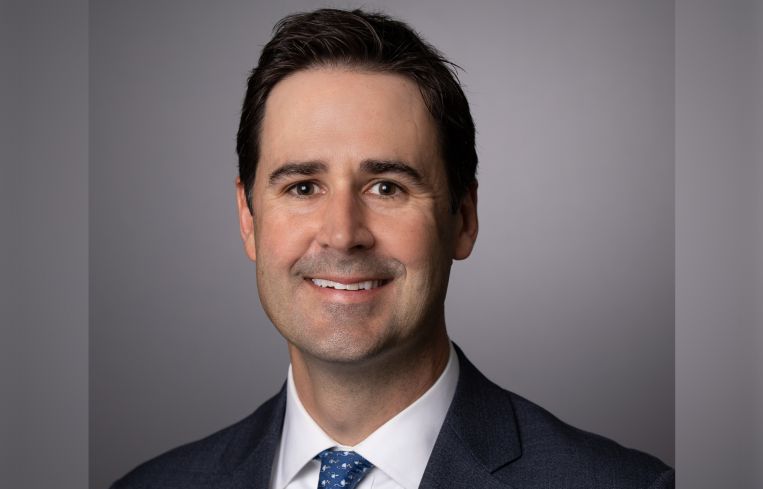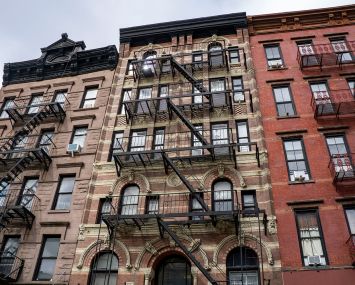Top Dog: Chad Phillips’s Plans for Running Nuveen Real Estate
By Brian Pascus July 14, 2025 6:30 am
reprints
Chad Phillips has been busy of late. On March 31, Phillips was appointed global head of Nuveen Real Estate, where he succeeded Chris McGibbon, who had held the position for the past six years. Phillips has been with Nuveen since 2019, and most recently was the firm’s global head of health care, office, retail and mixed-use, where he managed a 100-person team and $50 billion of assets and also led the firm’s investment and fundraising strategies across those asset classes.
Over the course of a 25-year career, Phillips has seen a lot. Now, he leads a firm with $105 billion invested in U.S. real estate and another $33 billion sitting in Europe and Asia. The firm carries a $43 billion debt fund, and invests nearly $100 billion of its capital into various equity positions. Commercial Observer sat down with Phillips to talk about his career and new role leading Nuveen.
This interview has been edited for length and clarity.
Commercial Observer: What did you accomplish at Nuveen to set you apart as its next leader?
Chad Phillips: Nuveen is an amazing place because it has the ability to grow people and put them in different roles. We’re a large and complex manager, so there’s different opportunities that arise. I was originally hired to run one of our resilient series open-ended funds, and brought on as portfolio manager, where I was put in charge of launching a core, open-ended office fund. That was my first role. At the time, I had high conviction in alternatives, so I put my thumbprint on the fund and said, “Why don’t we make it more of a medical office fund? It’s a little more stable with higher cash flows.”
That was my first high-conviction call — to convert an office fund to a medical office play. Probably within a year of running that fund, I took over a greater responsibility of running all our office-related investments in the U.S. taking on a much larger leadership role a year in, and then from there I took over the global opportunity role that combined office, health care and retail. So, it was a bit of a journey where I took on more opportunities with each experience.
How did you navigate the office sector coming out of COVID?
It was interesting. Look, we all have different challenges in building up resiliency in our careers. When I took over the office sector it was January 2020, and people got sent home from all the offices in March 2020. It was an unprecedented situation, so really the first thing we did was bolster our asset management skills and tracking capabilities. We went to looking at a daily reporting of collections and a daily reporting of who was in the office — figuring out how to manage the message of being open, but also trying to be considerate of our tenants’ desires. So we leaned in heavily to our asset management and reporting skills that required daily conferences of what was happening on the ground at that particular time. That was very interesting, and we didn’t really do acquisitions in the office sector because we wanted to understand where the world and demand was going.
You’re succeeding Chris McGibbon. What’s it like stepping into his shoes?
I’ve known Chris for over 20 years. We had interacted when I was at Guggenheim Retail Real Estate Partners and our company (Nuveen) was called TIAA, so we had done transactions together. I had invested into his vehicles and sat on one of his advisory boards, so I had deep experience with Chris prior to coming to Nuveen and always thought very highly of him. I always thought he was a step ahead of much of the competition in terms of forward thinking and innovation, and when we got the keys to run the company, along with CEO Mike Sales, a decade ago, they were very transformational.
We went to a sector model, a global model with 35 offices globally and unique products across the marketplaces. Chris is someone on the forefront style of leadership and transformational vision. I have always been very close to him and considered him a mentor for a long period of my career and have worked directly with him since I got here.
What will you do differently?
A lot of it is going to be business as usual, but I’m very extroverted — I want to be meeting with clients all the time, talking to the press, getting our message out. So I think there will be a different voice where I’ll be on the forefront, externally, quite a bit. So that’s one part, the leadership style. But from a vision perspective, you have to adapt. The world is changing very quickly. For instance, we’re leaning heavily into our retail sector, which we think is experiencing a retail renaissance. We see the fundamentals there and so we’ll grow that sector and have great leadership. That’s one thing you’ll see us go heavily into: open-air, grocery-anchored retail.
What makes Nuveen’s investment model so successful?
We have a model that generates outperformance. We’re global, we have scale, we’re $140 billion, but real estate is local, so we have 35 offices locally, and we’re sector specific. Our individuals wake up and think about multifamily housing or they think about industrial, and that’s all they do. We have embedded outperformance structurally because we have scale and get calls on every deal, off-market, on-market, brokers, counterparties. Because of our scale, we know about every deal out there, but because we’re local we understand nuances of each neighborhood and where demographics are going.
When you combine all of that, I think we’re set up structurally for a lot of outperformance, and that’s something that excites me. My previous firm didn’t have that same setup, and I thought the world was going either toward really small local groups or global players who have the same scale and capabilities we do.
What’s your personal investment strategy?
I like to keep it simple, so one of the ways I frame it is we like to invest in necessity-based real estate that caters to a large swath of underlying demand — and you can apply it to different property types. For instance, in retail, we go after grocery that’s necessity-based and is more resilient and isn’t dependent on GDP swings. Our thinking is you have to buy groceries regardless of the economic environment. Similarly, we apply the same construct to industrial, so we like to invest in light industrial where we invest into deals that are less than 200,000 square feet. We’re not going after mega-developments near ports, which might be more volatile with the tariffs, but when you go more granular and more infill that’s where we are.
Then you apply that to multifamily, where we’re more necessity-based multifamily, so that means we provide high-quality apartments to large swath of the population at fair incomes. We’re not going after the shiniest, most expensive multifamily asset. That concept about being needs-based with a lot of demand that’s more resilient applies to almost everything that we’re doing.
What’s the best advice you can give our readers about commercial real estate?
Best advice is there’s no shortcuts, you have to get in and do the work. You have to go out and network and create those relationships. There’s no shortcuts in creating a great peer group, a great networking group and understanding the details. The way to become a good investor is to dig in and understand the cash flows and where they are.
Brian Pascus can be reached at bpascus@commercialobserver.com



